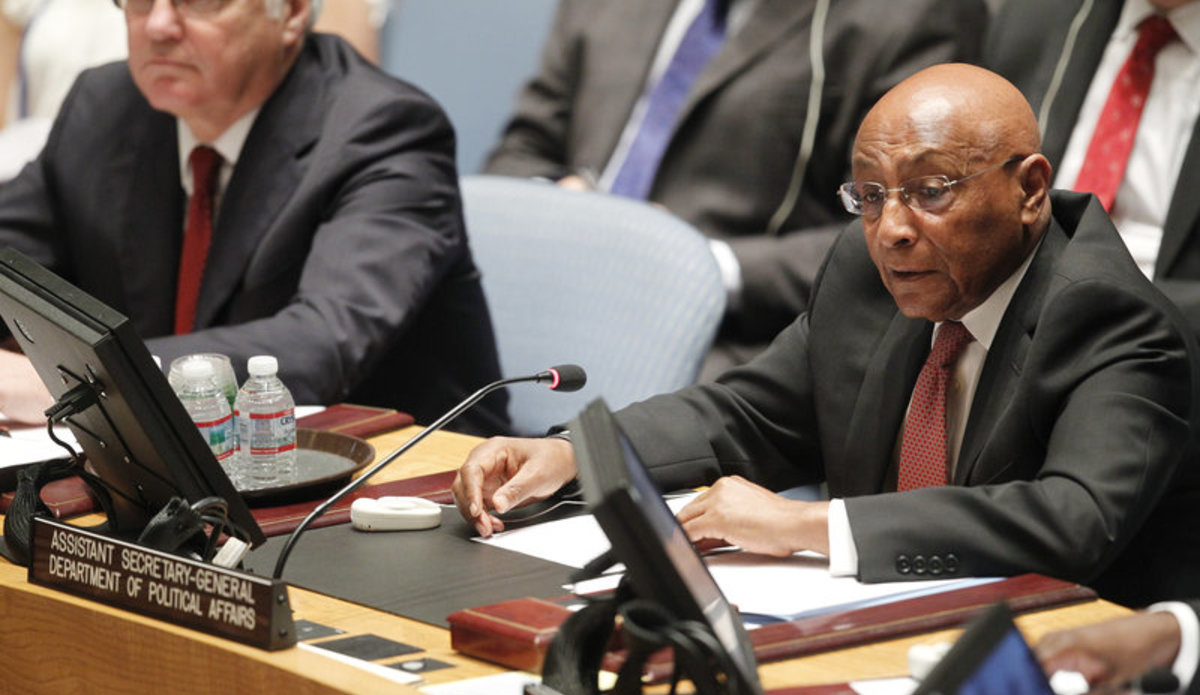Mr. President,
Members of the Security Council,
Thank you, Mr. President for this opportunity to brief the Security Council on recent developments in Ukraine.
Due in large part to the initiative taken by President Petro Poroshenko since his inauguration on 7 June to find a peaceful, lasting resolution to the crisis in Ukraine, as well as to the unrelenting efforts of the international community, there are encouraging signs towards de-escalation of the conflict in Ukraine, and political and diplomatic steps are beginning to emerge towards the resolution of the crisis.
On 20 June, Ambassador Yuriy Sergeyev of Ukraine presented the Secretary-General with an official copy of President Poroshenko’s multi-faceted peace-plan, which included de-escalatory measures such as amnesty for those who did not participate in “serious crimes”; disarmament; decentralisation of power and early local and parliamentary elections; and a program for creation of jobs in the region.
Simultaneously, upon the advice of his military commanders that the border with the Russian Federation has been secured,President Poroshenko, on 20 June, announced the start of a one week long unilateral cease-fire aimed at giving armed militia a window of opportunity to disarm. Government forces were ordered to withdraw from their engagements, allowing rebels a chance to lay down their weapons. All rebels who surrender peacefully, and who have not committed “grave crimes” would be granted amnesty.
Also, with a view to engage with Ukraine’s eastern regions, the President on 19 June travelled to Donbass region where he met with civil society, business and political leaders. The following day, he travelled to conflict areas in Donetsk and Lugansk.
On 21 June, the Secretary-General spoke to President Poroshenko over the phone, expressing his encouragement over the peace-plan and in particular the start of a unilateral cease-fire. At the same time, the Secretary-General voiced concern that it may be difficult to halt the violence without the engagement of the armed groups
The Secretary-General has since been pleased to see that peace-talks have reportedly started with representatives of armed groups in eastern Ukraine, led by former Ukrainian President Leonid Kuchma and with the participation of the Russian Ambassador to Ukraine and European officials. The Secretary-General has stressed that such talks are indispensable in efforts to help defuse tensions.
The Secretary-General has also taken note that the armed militia groups have agreed to reciprocate the cease-fire, despite previously rejecting the President’s offer and continuing their offensive. Overall, the cease-fire is holding. The Secretary-General expects all sides to live up to the ceasefire and to leave the door open for effective negotiation and mediation toward a peaceful resolution of the crisis.
Today, in a welcome development and one that will not only help reduce tensions but also improve the chances for a negotiated settlement, President Putin asked the Russian parliament to revoke the authorization to send troops to Ukraine. President Poroshenko’s office welcomed the move as “the first practical step” after President Putin expressed support for the former’s plan for a peaceful settlement of the situation in eastern Ukraine.
Mr. President,
While le these are important steps, with the potential to de-escalate the situation, the Secretary-General remains deeply concerned that the realities on the ground are still grave and deeply worrying.
Until these recent positive developments, fierce fighting particularly in eastern Ukraine had raged on, claiming hundreds of lives and injuring many more, including civilians. Arms, weapons and fighters have crossed Ukraine’s border, making the situation more complex and more violent. Various rebel groups have sprung up uncoordinated, and are reportedly not fighting for any particular cause.
Even after President Poroshenko announced the cease-fire, the armed groups had publicly rejected the offer and continued their assault on Ukrainian forces on the night of 20-21 June, reportedly injuring six servicemen. During that same period, other reports indicate that Ukrainian forces also continued their “security operation”, although it was unclear if they were merely defending themselves against attacks. The Russian Federation has reported that shells from these exchanges had crossed its border, causing material damage.
On 14 June, A Ukrainian Ilyushin-76 military transport plane was shot down while approaching an airport in Lugansk. The plane was targeted by armed militia on approach to the Lugansk airport and crashed at 12:50 A.M. local time. All 49 people on board, including 40 paratroopers, were killed.
The OSCE monitors abducted almost a month ago on 26 and 29 May are still being held captive. The Secretary-General reiterates his call for their immediate and unconditional release.
The fighting has resulted in loss of lives and caused much suffering to innocent people. It is as much in the interest of these innocent people that effort must be made to urgently capitalise on the progress which has been made in the political and diplomatic areas.
The Secretary General has been stressing all along that the international community cannot afford to fail Ukraine and its people. He has reiterated the pressing need for the international community to work together to stop the hostilities and help achieve lasting peace.
President Poroshenko’s peace-plan has received support from key parties in the country, the region and beyond. However, there is still more hard work to be done. The international community needs to support Ukraine in surmounting the current crisis and finding a peaceful and lasting resolution to the challenges facing the country.
The United Nations stands ready to support all efforts to that end.
Thank you.

